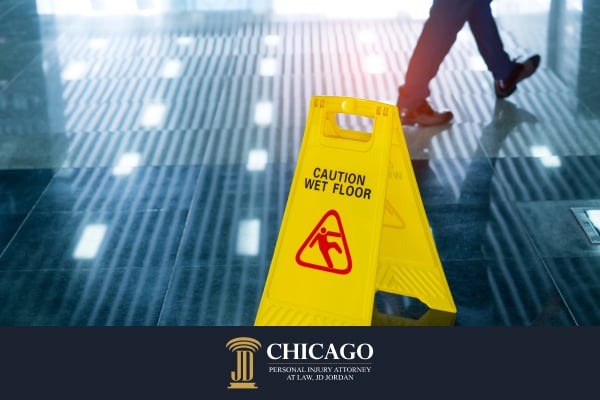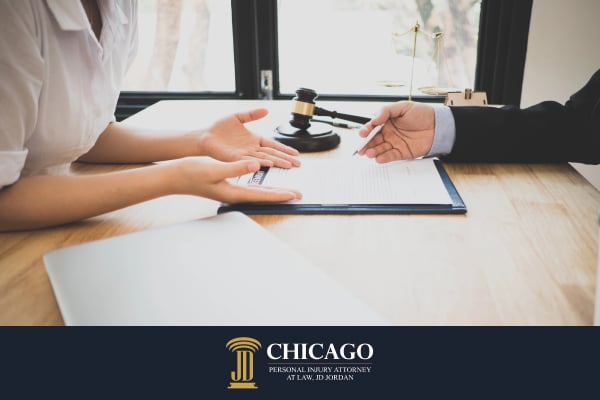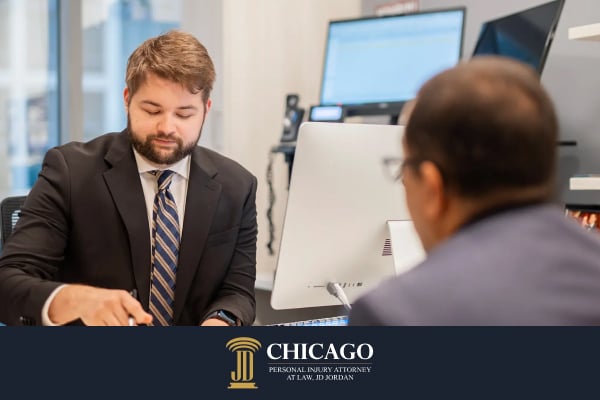



At Chicago Personal Injury Attorney at Law, we fight for people who have been hurt because property owners failed to keep their premises safe. We know how a sudden fall can change your life in seconds, leaving you with painful injuries and mounting medical bills. Our law firm has helped hundreds of slip-and-fall victims across Chicago recover millions in damages from negligent property owners and their insurance companies. Learn more about how we can help you file a legal claim and demand financial compensation.
Many people who slip and fall hesitate to seek legal help because they feel embarrassed or think they should have been more careful. This mistake can cost you thousands of dollars in medical bills and lost wages that you shouldn't have to pay. Property owners have a legal duty to maintain safe environments for visitors, and when they fail in this duty, they become legally responsible for injuries that result. Our experienced attorney team knows exactly how to investigate these accidents, identify all liable parties, and build strong premises liability claims that get results.
Insurance companies often contact fall victims quickly with settlement offers that seem generous but fall far short of covering long-term needs. They hope you'll accept before talking to a personal injury lawyer who can tell you what your case is actually worth. Without legal representation, you might not realize you can claim compensation for future medical care, lost earning capacity, and personal injuries that affect your daily life. Our accident lawyer team handles all communication with these insurance adjusters, preventing them from using your words against you while we fight for maximum compensation.

Slip and fall accidents can happen almost anywhere, but certain hazardous conditions appear repeatedly in the cases we handle across Chicago's commercial and residential properties. These dangerous conditions often exist because property owners cut corners on maintenance or fail to address known safety issues promptly.
Wet floors cause countless falls in grocery stores, restaurants, office buildings, and apartment common areas across Chicago. Spilled liquids, freshly mopped surfaces without warning signs, and tracked-in rain or snow create slippery surfaces that give people no chance to maintain their balance. Store employees who neglect to check aisles regularly for spills or maintenance staff who don't place caution signs around wet floors directly contribute to these preventable accidents. The sudden loss of traction on these slick surfaces often sends victims falling backward, leading to serious head and spine injuries when they strike the hard floor.
Icy sidewalks become particularly dangerous during Chicago's harsh winters when property owners fail to remove accumulated snow and ice promptly. Illinois law requires reasonable snow removal efforts from commercial property owners, landlords, and even homeowners in many cases. Many falls occur when ice forms in depressions or cracks in walkways, creating nearly invisible hazards for pedestrians. The worst injuries often happen early in the morning or after dark when poor visibility combines with black ice to create perfect conditions for devastating falls.
Loose carpets, unsecured rugs, and frayed flooring create tripping hazards that catch people's feet mid-stride, often causing violent falls. Hotels, office buildings, and retail stores frequently have areas where carpeting has become worn or buckled, creating raised areas that become serious trip risks. Throw rugs without non-slip backing slide easily on hard floors, especially when stepped on by elderly visitors who may already have mobility challenges. These preventable hazards often remain in place for months despite presenting obvious dangers to everyone walking across them.
Inadequate lighting in stairwells, parking garages, hallways, and outdoor walkways makes it impossible for people to spot potential hazards before it's too late. Dark areas hide uneven surfaces, unexpected steps, obstacles, and changes in flooring material that would be easily avoided in proper light. Many property owners neglect regular light bulb replacement or install insufficient fixtures to save on electricity costs, directly contributing to preventable falls. The combination of poor lighting and any other hazard, such as a small spill or loose carpet edge, creates particularly dangerous conditions for visitors of all ages.
Broken handrails or missing grab bars create serious fall risks in areas where people naturally reach for support, like stairways, ramps, and bathrooms. Building codes require secure handrails of specific heights and strengths on stairs precisely because falls in these areas typically result in severe injuries. Landlords and building managers who delay repairs to loose or damaged railings put every visitor at risk, especially older adults and people with mobility issues. The consequences of falls on stairs are typically more severe than level-surface falls, often resulting in multiple impact points as victims tumble down several steps.

Successful premises liability claims require proving that the property owner knew or should have known about the unsafe condition that caused your fall. Our team investigates maintenance records, security footage, previous complaints, and employee statements to establish how long the hazard existed before your accident. We must also demonstrate that the dangerous condition directly caused your injuries and that you weren't somewhere you shouldn't have been when the fall occurred.
Your legal status on the property plays a crucial role in determining the duty of care owed to you under Illinois law. Business customers receive the highest protection as "invitees," while social guests are "licensees" with somewhat fewer protections, and trespassers have limited rights except in cases involving children. Our firm knows exactly how to frame your case based on your specific situation and the relevant legal standards that apply to your status at the time of the accident.
Illinois law requires property owners to take reasonable care in maintaining their premises, but this standard changes depending on the type of property and circumstances involved. For commercial properties like stores and restaurants, owners must regularly inspect for hazards, promptly clean spills, and warn visitors about dangerous conditions they haven't yet fixed. This higher standard exists because businesses specifically invite people onto their property for financial benefit.
Residential landlords must maintain common areas like lobbies, stairwells, and walkways in a reasonably safe condition for tenants and their guests. Private homeowners generally have less strict obligations to social visitors, though they still must warn about known dangers that guests wouldn't easily notice. Our legal team understands these nuanced standards and knows exactly what evidence will convince a judge or jury that a property owner failed to meet their specific level of reasonable care in your case.

You likely have a valid claim if you fell because of a dangerous condition the store should have addressed, like a spill, torn flooring, or an obstacle in the walkway. Your case becomes stronger if the hazard existed long enough that store employees should have discovered and fixed it during regular inspections.
Take photos of the exact hazard that caused your fall, the surrounding area, any relevant warning signs (or lack thereof), and your visible injuries. Also, collect names and contact information from witnesses, request any security footage that might have captured your fall, and get a copy of any incident report filed by the business.
Illinois law generally gives you two years from the date of your accident to file a personal injury lawsuit for slip and fall injuries. This deadline is just one year if your claim involves a local government entity, such as a city building or public school.
Yes, you can pursue a premises liability claim against your landlord if you were injured due to negligent maintenance of areas they control, such as common hallways, stairwells, or building entrances. Your lease agreement and Illinois landlord-tenant laws will help determine the scope of their legal responsibilities.
The presence of warning signs doesn't automatically shield property owners from liability, especially if the warnings were inadequate, poorly placed, or if the hazard was particularly dangerous. Many "Caution: Wet Floor" signs are placed after someone has already fallen or is left standing, even when no actual hazard exists, potentially making them less effective as warnings.

Don't let a property owner's negligence leave you struggling with medical bills and lost income when Chicago Personal Injury Attorney at Law can help you fight for the money you deserve. Our experienced slip and fall team offers free, no-obligation consultations to discuss your case and explain your legal options clearly. We handle all premises liability cases on a contingency fee basis, meaning you pay nothing unless we win compensation for your injuries. Call our office today to speak directly with a slip and fall accident lawyer who can start protecting your rights immediately.
